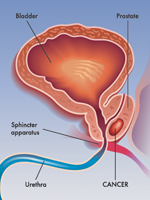Prostate Cancer
By Wayne Kuznar
San Francisco, CA—Today, patients who receive stereotactic body radiation therapy (SBRT) for intermediate- or high-risk localized prostate cancer are not receiving concurrent androgen-deprivation therapy (ADT), despite national guideline recommendations that support the concurrent use of ADT with radiation therapy. Read More ›
On May 19, 2020, the FDA approved a new indication for olaparib (Lynparza; AstraZeneca), a PARP inhibitor, for the treatment of men with metastatic castration-resistant prostate cancer and deleterious or suspected deleterious germline or somatic HRR mutation, as determined by an FDA-approved test, whose disease progressed after enzalutamide (Xtandi) or abiraterone acetate (Zytiga) therapy. Olaparib is the first FDA-approved PARP inhibitor for prostate cancer. Read More ›
By Phoebe Starr
Enzalutamide (Xtandi) and apalutamide (Erleada) had strong showings in 2 separate, randomized phase 3 clinical trials demonstrating that these drugs delay disease progression when added to background androgen-deprivation therapy (ADT) in patients with metastatic, hormone-sensitive prostate cancer. Read More ›
Prostate cancer, the second most common type of cancer in men, is expected to affect 11.6% of all men during their lifetime. In fact, more than 3 million men in the United States are living with prostate cancer. It is estimated that in 2017, 161,360 men were newly diagnosed with prostate cancer, and 26,730 men died from the disease. Read More ›
Prostate cancer is the third most common type of cancer in the United States, after breast cancer and lung cancer. In 2018 alone, 164,690 individuals were diagnosed with prostate cancer, accounting for nearly 10% of all new cancer cases, and 29,430 deaths were attributed to the disease. Prostate cancer is most frequently diagnosed in men aged 65 to 74 years (median age, 66 years). More than 98% of patients with prostate cancer survive ≥5 years; however, the 5-year survival rate drops to 30% for patients with metastatic disease. Read More ›
By Phoebe Starr
Darolutamide, an investigational androgen receptor inhibitor, significantly improved metastasis-free survival in men with high-risk nonmetastatic castration-resistant prostate cancer (CRPC) compared with placebo in a large phase 3 clinical trial. Read More ›
By Phoebe Starr
According to the results of 2 separate clinical trials presented at the 2018 Genitourinary Cancers Symposium, apalutamide and enzalutamide reduced the risk for metastasis and prolonged metastasis-free survival in patients with nonmetastatic castrate-resistant prostate cancer.
Read More ›By David King
Adding abiraterone to standard initial treatment that includes androgen-deprivation therapy (ADT) increased survival and reduced mortality risk by 37% over 3 years versus standard of care in the STAMPEDE study of men with locally advanced or metastatic prostate cancer.
Read More ›By Phoebe Starr
Enzalutamide did not increase the rate of seizures in men with metastatic castration-resistant prostate cancer (mCRPC) who had potential risk factors for seizure, according to results of the phase 4 UPWARD trial. Read More ›
Page 2 of 2
- 1
- 2



